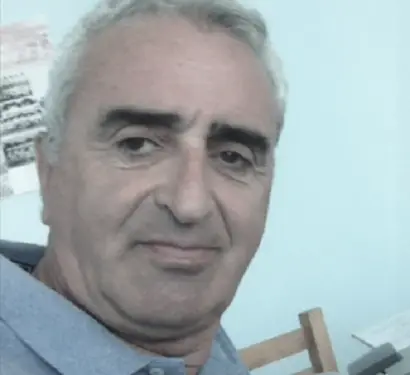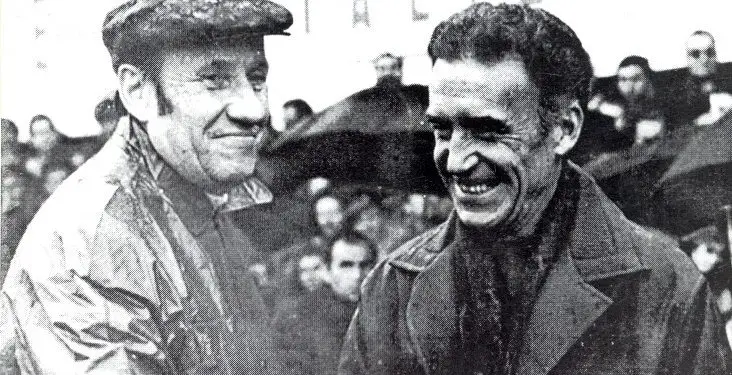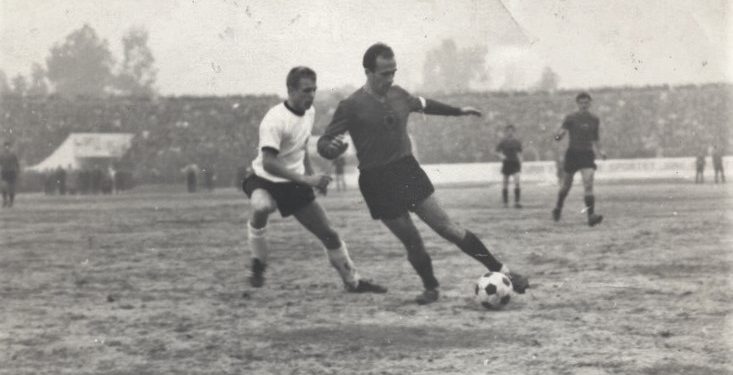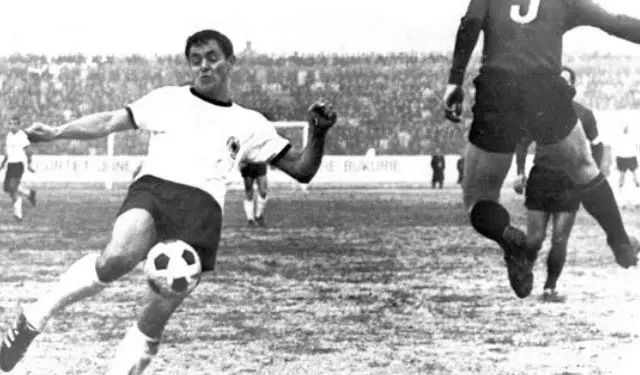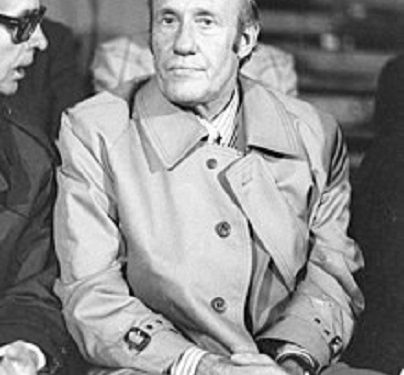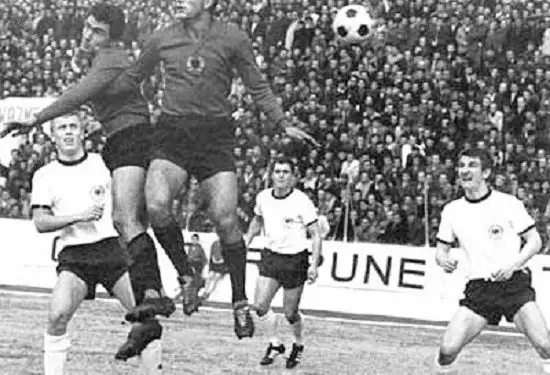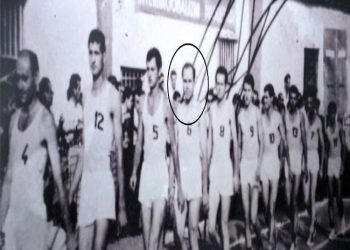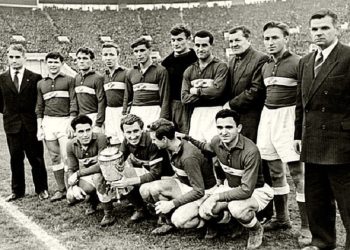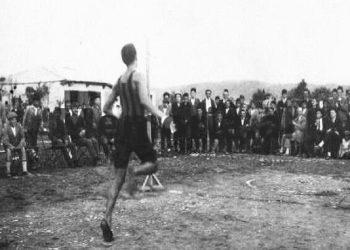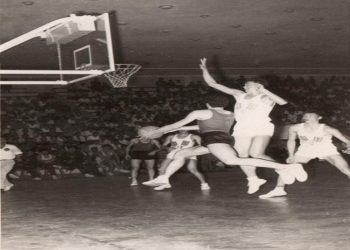From Uvil Zajmi
The first part
Memorie.al / From Sunday to Monday, but not a week apart, but 55 years…! Yes, a little more than half a century from December 17, 1967, when Albania drew 0-0 with the Federal Republic of Germany. How do you remember today, what was the atmosphere on the eve of it? A people standing for the heroic act of Shkurte Pal Vata (“Heroine of Socialist Work”) and helping those injured by the earthquake in the districts of Dibra and Librazhdi, where the entire high leadership of the party and the state had moved and stayed, with led by Enver Hoxha and Prime Minister Mehmet Shehu! Then the match: From the absence of Gerd Müller and Franc Beckenbauer, to the giant banner that read: “Complete electrification of the village, bright work of the Party led by Comrade Enver Hoxha…”, which surprised the West Germans! The surprises of coach Loro Boriçi, the disallowed goal of Dynamo player Fred Gjinali, the party at “Qemal Stafa” and the surprise elimination of Germany. The reaction of the world sports press and a rare photo published in the Dortmund Museum. What do they do today, where are the protagonists of the monumental challenge of that national team, which eliminated and left out the European ’68, Helmut Schön’s West Germany?
From Dortmund to Tirana
Going back to the meeting Germany-Albania (6-0), in April 1966, the next day, Lym Alla’s national team, after leaving Dortmund, landed in Italy, to stay 24 hours in the Italian capital, because they were missing airlines with Albania. The footballers have taken advantage of the “freedom”, dividing into groups; someone followed the “Roma”-“Lazio” derby at noon, while others ended up at the cinema.
Otherwise, the coach Myslym Alla has sought and met the Albanian Naim Kyeziu, the former player of Rome. A meeting that was not liked by the Albanian governors, reflected this attitude, after the return and debates in the following analyzes with leaders of the Albanian Football Federation.
“Heroine”, Skurte Pal Vata and the shocking earthquake…!
Such was the situation that preceded the meeting between Albania and the Federal Republic of Germany. In the youth action, for the construction of the Rrogozhinë-Fier railway, in the Dushk sector, during the works in October, Shkurte Pal Vata, a 17-year-old girl from Dukagjini, Shkodra district, was injured and, after a few weeks, died.
Her accidental death was publicized, turning her into a media personality with great resonance for the time.
As if this was not enough, a shocking event was that of November 30, when a powerful earthquake struck the districts of Librazhd and Dibra in the north-eastern area of Albania, destroying 177 villages, killing 12 people and injuring 174 others. . As a result, the whole of Albania stood up, showing solidarity with the injured families. The government and leaders led by Enver Hoxha visited the villages and there was a great popular mobilization.
In Albania at the end of the sports and cultural-artistic year
From the decision of the government, the one of December 5, 1965, on the electrification of all the villages of Dukagjin, Kelmendi and Shkodra district, we go to the volleyball challenge for men, “Dinamo” of Tirana, – “Partizani” of Belgrade, which ends 3-2, in the match played in Tirana. Then the hatching of the traditional survey “5 best sportsmen of the year” and “Dinamo” and “Vllaznia” (the one assigned to the Balkan Cup), are finalists of the AFL Cup.
The “Student” team won the Cup of the “Luftëtari” newspaper (an organ of the Ministry of People’s Defense), the youth of “Vllaznia” that of the “Central Committee of the Union of Albanian Labor Youth”, while “Ylli Kuq” of Pogradec receives the Cup of the “People’s Sport” newspaper.
In Turkey, the 7th European Volleyball Championship for Men ends and Albania is last in the ranking. That December of 1967, there is the historic announcement in the “Sporti Popullor” newspaper of December 19, where it was said that: “On January 15, 1968, the Sports Mastery School will be opened in Tirana”. Along with them, some artistic events, such as the films “Silent Duel”, “Ngadënjim over the death”, very attended by the citizens of that time. While the musical world includes “Sergeant Pepper’s lonely hearts club band”, considered the most beautiful album of the “Beatles”.
Towards the confrontation, Beckenbauer and Myler do not come!
Before the December 17 meeting Albania-German FR, the group standings were as follows: Yugoslavia 6 points (3 /1/ 0/ 7-3; German FR, 4 points (2/ 1/ 6-1); Albania: 0 points, 0-10. From the information received by the Albanian Football Federation, the German team had gathered these footballers: H. Volter, H. Hotges, R. Libuda, M. Maglitz, V. Shulc, H. Siemensejmer, V. Veber, V. Overat, J. Lohr, H. Vogts, G. Netzer, P. Mayer, S. Mayer, G. Myller, B. Patzke, K. Fishtel, V. Ferdinat, H. Vimler, S. Gygiet, G . Volkert, H. Hornig, H. Kupert.
From the formation of April 1966, Coach Helmut Schön, takes only six players, defenders Patzke, Hotges, Shulc Veber, midfielder Overat and striker Lohr. The goalkeeper Tillkovski, Bekebauer, Dorfel, Ulsas, Myler does not come. Meanwhile, the goalkeeper Horst Volter, from “Eintracht” B., (his first with the national team), the players Peter Meyer and Siegried Held, from “Borussia” Dortmund, the striker Hans Kupers from Futboll-Club “Nuremberg” and in the midfield, not getting Zeler, along with Overat, comes Gunter Netzer from Dortmund.
The Albanian national team also changes
Albania also has other players from the April match and the last one with Yugoslavia: From the Dortmund match, goalkeepers Mikel Janku, Fatmir Frashëri, Niko Xhaçka, Skënder Hyka and Bahri Ishka will not play, while from the meeting with Yugoslavia, they will not to be: goalkeeper Jani Rama, Gani Xhafa, Foto Andoni. While against the Federal Republic of Germany, coaches Boriçi and his assistant, Ilia Shuke, would activate two new names: in the goal, Koço Dinella of “Skënderneu” of Korça and with him the right wing defender, Fred Gjinali, of two already from “Dinamo” of the capital.
In the center of the defense, Frederik Jorgaqi does not move, restores Xux Kazanxhiu, reconfirms Medin Zhega, keeping stable and unchanged the traditional block with Teodor Vaso, Ramazan Rragami, Ali Mema and Panajot Panon, protagonists of all meetings, while the captain’s armband of Lin Shllaku maintained that in Dortmund, due to health reasons, he did not travel.
The surprise of the lineup, Dinella of “Skënderbeu” of Korça
The day before the meeting, while they were gathered in the “Donika” hotel in Tirana, in the dilemma between Mikel Janku and Jani Rama (the latter also injured), Boriçi stunned everyone when he announced the formation, declaring that in gate, it would be Koço Dinella, a 20-year-old young man with no experience. Koço himself remembers that match like this: “I had no clue about the formation. I was surprised, neither I nor the team expected it, when the coach read the list and said my name. But also of Gjinali. I adored Mikel Janku and I felt in trouble that, in that meeting, he would be my reserve”.
Fred Gjinali, surprising…!
It would not be the first, or the last, of Boriçi who, with the unexpected elections of the last few hours, would surprise not only the Albanian environment, but also the opposing one. In this particular case, he surprised the West Germans, as in ’67, but also in 1971, with the defender Astrit Ziu, as a left forward. The idea to take Fred Gjinali, the energetic side defender of “Dinamo” of Tirana, to the national team, came due to some absences, such as those of Fatmir Frashëri and Mihal Gjika, who were injured.
Uncollected, Gjinal was notified just a few days before the meeting to appear at the Ministry of Defense’s Convalescence Center in Plepat, Durrës. With attacking features and powerful shooting, attacking from the wing, it was Coach Skënder Jareci who, as a consultant, proposed this player to Boriçi. He approached without noise, although he did not play a single minute in the friendlies played against the youth of “Partizani” and “Vllaznia”, putting him in the starting line-up against the West Germans.
The Federal Republic of Germany, in Tirana for the first time!
From the final in “Wembley” in London, until before the meeting with Albania, FRY had played ten matches. FRY – Morocco, 5-1, friendly; 1-0 with Bulgaria; 6-0 with Albania; Yugoslavia – German FR, 1-0, FRG – France, friendly 5-1, FRG – Yugoslavia 3-1 and the last, on November 22, 1967, in Bucharest, Romania – FRG, 1-0 (friendly).
In this meeting, the German RF played with Volter, Patzke, Shulc, Veber, Beckenbauer, Overat, Libuda, Meyer, Zeler, Lohr, Myller. While in Tirana, the Germany of football came for the first time, although Veber’s overtime with Cologne had been in 1964 for the Champions Cup, 0-0 with “Partizani” at the “Qemal Stafa” Stadium.
Meanwhile, for the Champions Cup, while the draw for the 1967-’68 edition had pitted “Dinamo” of Tirana against “Eintracht” of Braunschweig, this meeting did not take place, as in the last moments, the Albanian team withdrew from the activity. Thus, those 90 minutes on December 17, 1967, among the representatives, apart from great curiosity, were decisive and were followed with great interest by Europe, in particular by Yugoslavia, since its result directly affected the qualification of the European, “Italy ’68”.
Everyone was convinced that the Federal Republic of Germany was normally the favorite, no one thought that the “Qemal Stafa” stadium had once witnessed a sensational result and elimination of the famous George Best’s Ireland from the World Cup “England” ’66”, after the spectacular 1-1 draw. This time, the modest capital plant would punish another great formation, West Germany, world runners-up.
The slogans in the stadium, which surprised the West Germans!
Already accustomed to sports advertisements, those of well-known brands, the Germans were surprised when in the national stadium “Qemal Stafa”, in its internal and external environments; they encountered giant banners (banners), typically with messages with socialist content. , such as: “Physical education is part of communist education”; “The glory of Marxism-Leninism”; “Long live the Central Committee of ALP”; “Defending the homeland is a patriotic duty” etc.
But, it: “The complete electrification of the village in 1971, a great work of the Party”, placed along the stand in front, has made the friends from capitalist Germany quite curious. Considering it a great message of fandom, friendship or something else, always sports, they were surprised when their translator and companion, the well-known dentist Pano Lula, told them what it was all about.
Tickets at “Qemal Stafa”, only with authorization!
Tickets for the long-awaited match, Albania – FRGJ, were issued only by authorization. This is how it worked in those years, when an important international meeting was played, not only in football, but also in other sports. For the match with Germany, finding a ticket was almost impossible. The “black market” barely functioned and tickets were issued with authorization in institutions and manufacturing enterprises, for officials, managers and distinguished employees. The price was doubled, from 30 ALL (old) which was the grandstand in the championship matches, to 60 ALL.
Mainly in stands A and B were high officials or their families. Few tickets were given to football players, even the captain Lin Shllaku, remembers that, even a few hours before the meeting, the football players wandered to the FFA offices, to get tickets for their people and friends. For journalists, radio reporters, the few television reporters, there were booths. Some of the spectators were standing in the central tribune, as well as on small benches in the last row in the front tribune, or as it was known, the twenty.
Sunday, December 17, 1967, “Qemal Stafa” Stadium, 14:00
Albania: Koço Dinella, Fred Gjinali, Frederik Jorgaqi, Justin Kazanxhi, Ali Mema, Teodor Vaso, Ramazan Rragami, Lin Shllaku, Sabah Bizi, Panajot Pano, Medin Zhega. Coach: Loro Boriçi.
RF German: Volter, Patzke, Veber, Shulc, Held, Hotges, Overat, Netzer, Kupers, Meyer, Lohr. Coach: Helmut Saint.
Referee: Ferdinand Marshall, Franc Verer, Jozef Titel (Austria).
Cornet: 3-3
Spectators: Over 20 thousand.
Terrain: Slightly rough, bad weather with light rain.
Colors of jerseys: Albania red and black, R.F. German, black and white.
The match between Albania and the Federal Republic of Germany, on December 17, 1967, was massively followed by all of Albania, since that afternoon, it held its breath at the voice of Radio-Tirana and that of Albanian Television, who owned such a device. The meeting was commented on Radio Tirana, by the legends of the Albanian sports microphone, Anton Mazreku and Ismet Bellova, and was broadcast on RTSh, (from the Television Experimental Center) with the commentary of the well-known journalist, Alfons Gurashi, a young man at the time.
Gjinali’s shot and the goal denied…!
Those 90 minutes was Fred Gjinali’s first and last, along with two unforgettable shots which sum up his career with the national team. Minute 52: From a pass by Ali Mema, Gjinali hits Tokazi, unexpectedly and the goalkeeper Volter, reacts late, cuts the ball, but for many people present in the stadium (mainly those in stand “A”), the ball has crossed the line of the gate, but who do not think so, the assistant Verer and the referee Marshal.
Even the only photo of this moment, by the well-known photographer of ATSH (Albanian Telegraphic Agency), Enver Sahabani, shows the throw of the German goalkeeper, Volter, in a suspicious position, where the stain of lime is clearly visible on his chest of the white line.
He immediately started the game, but out of confusion, the German defense let the ball go out on the sidelines. With his quick introduction into the game, in a few seconds, the ball stops at the feet of Gjinal, located in that position about 20 meters from the southern gate, he hits once more strongly and Volter, flying away, removes the ball in the corner. Memorie.al
The next issue follows




